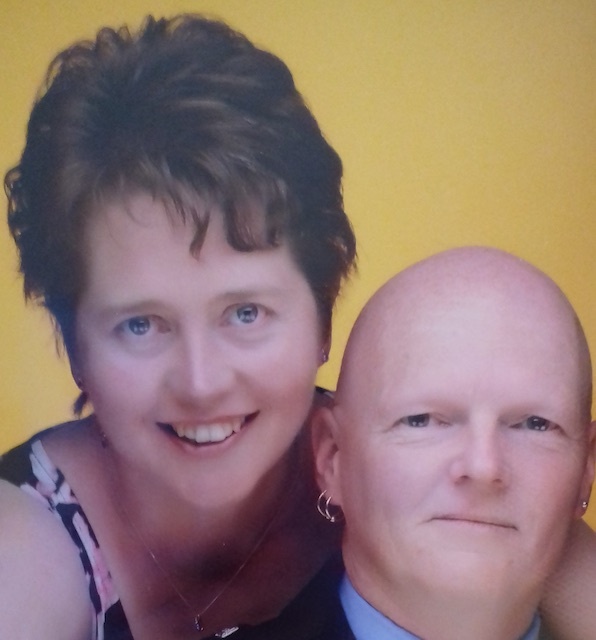A woman with multiple sclerosis (MS) from the Highlands has shared her experiences of taking part in a landmark trial for people living with the condition.
Sheila Geddes (pictured with her husband) has secondary progressive MS and is participating in the MS-STAT2 trial which will test if the inexpensive treatment simvastatin – currently used to treat high cholesterol – can slow disability progression over a three-year period.
Sheila Geddes, 50 from Castletown, is a nurse and was diagnosed with MS in 2010 but had been experiencing symptoms for decades previously.
She said:
“MS primarily affects my walking due to balance and muscles cramps or spasms.
“I use two elbow crutches at the moment and sometimes a zimmer if I’m tired and at home by myself – I think part of it comes down to fear of falling.
“Before the pandemic I was getting regular massage which really helped but that’s had to stop and I’ve felt the difference.
“I first heard about the MS-Stat2 trial because I’d done a trial before and, as a nurse, I know that research can be a great way of finding new treatments.
“So, when I saw it on the MS Society website and this chance came up to be involved I absolutely jumped at it.
“In the past I’ve tried using different treatments like relaxants but it hasn’t worked for me so getting the chance to try something else and contribute to finding new treatments has been good.”
The MS-STAT2 trial is a double-blind trial, meaning half the participants will take the drug and the others will be on the placebo.
The MS Society is co-funding this study to confirm if simvastatin can slow or stop disability progression for people with secondary progressive MS.
The trial began in summer 2017 and will involve 1,050 people with secondary progressive MS.
It will take six years to complete and involve over 30 trial centres across the UK including the Anne Rowling Regenerative Neurology Clinic at the University of Edinburgh.
Sheila continued:
“I don’t know whether or not I’m on the drug or the placebo but being involved is very positive.
“Being part of something worthwhile is a great and if it doesn’t help me then fingers crossed, if it’s shown to be effective, it can help others.
“Everything is very well thought out, well organised, you’re very well supported and there’s some limited financial support for travel.
“There’s no pressure, and you are free to drop out whenever you like.
“I’d really encourage anyone who’s interested in taking part to take a look at it as it’s been a good experience for me and a great chance for people in the north of Scotland to get involved in research.”
Currently there is one treatment available in Scotland for people living with secondary progressive MS.
Siponimod was approved in 2020 by the Scottish Medicines Consortium (SMC) for use on the NHS in Scotland.
If this trial is successful, simvastatin could join it as one of the first treatments licensed for secondary progressive MS and broaden treatment options.
MS is a neurological condition which damages nerves in your body and makes it harder to do everyday things, like walk, talk, eat and think.
It’s different for everyone and can be relentless, painful, and disabling.
More than 15,000 people in Scotland have MS, one of the highest rates of the condition in the world.
Morna Simpkins, Director of MS Society Scotland, said:
“We are incredibly proud to be the UK’s biggest charitable funder of MS research and to be co-funding the MS-STAT2 trial because we know what it could mean for people living with progressive MS.
“There are now over a dozen licensed treatments for people with the relapsing form of MS, and some emerging for early active progressive MS – but there is a huge unmet need for treatments that can slow or stop the rate of disability progression in the advanced stages of the disease.
“We have never been closer to stopping MS, and we believe treatments that slow or stop disability progression are a very real prospect.
“If you are interested in taking part we would encourage you to find out more.”
The MS-STAT2 team are looking for people with secondary progressive MS, who are willing travel to Edinburgh, to take part in the trial.
If you’d like to find out more please click here.
The MS-STAT2 trial is funded by the MS Society, NIHR Health Technology Assessment programme, and National MS Society.
For more information about MS and to find support please click here.



